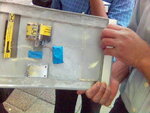

As technology allows people to be more connected and makes life more convenient in many ways, it has also been a boon to scammers seeking to defraud people of their money.
Gatesville Police Lt. Cody Lee gave a presentation on financial crimes during a July 7 meeting of the Gatesville Exchange Club.
"It's horrible the amount of crooks out there who will take you for every dime you have," Lee said.
One problem that has been around for a while that is seeking an uptick again is the illegal placement of card skimmers at gas pumps that allow people to make payments directly at the pump rather than having to pay a clerk inside a store or gas station.
That convenience comes with a danger, as card skimmers can steal financial information from people and then can be used to take their money.
"Always bypass entering your PIN (personal identification number) when you are getting gas and run (the transaction) as a credit charge," Lee advised. He said the information stored in the keypad can be retrieved by scammers for theft.
"The safest thing – I know it's not convenient – is to go into the store and pay." Lee said. "Other than that, pay as credit all the time."
While scammers can target anyone, they especially like to take advantage of older people, he said.
"They generally prey on the elderly," Lee said. "They learn all types of information including their grandkids and where they live. They will call and say someone is in jail in Mexico and that you need to send $10,000 on an Amazon card to help them.
"People fall for it and send the money, and then they realize it's a scammer. If anyone has any question or concern that something might be a scam, you can call the police department."
Social media – including the opportunity for an online romance – can also pose a danger to people's finances.
Lee talked about a couple who had moved from the Dallas area to Bosque County, buying 180 acres of property to live on during their retirement.
"Everything was paid for and he (the husband) died and left her (the widow) with about three-quarters of a million dollars," Lee said. "She had no worries financially."
Unfortunately, a man posing as a romantic interest "promised to be her knight in shining armor" but asked for money to help with unforeseen or emergency expenses little by little, until the woman's money was gone. Then the man no longer made contact, likely seeking to move on to his next victim.
"All three of her kids told her she was being scammed but she didn't believe them," Lee said. "She kept sending him money and insisting that he was going to come to her, but he never showed up."
Lee said another tactic scammers use is to steal information from old bills or other financial records that people throw away.
"Keep any old financial paperwork, and if you need to get rid of it, you can shred it or burn it," he said. "Don't just throw it in the trash. People dig through the trash and they use (the financial information) for credit applications. It can harm your credit."
Lee said he is also aware of instances in both Coryell and Bosque counties where someone calls and says they are a police officer or officer of the court, and that someone has unpaid debts that they must pay immediately or risk being arrested. Those are scam attempts to get people's financial information or to get them to make transactions and send money to the caller.
Lee said if anyone is contacted and told that, they should go to the police department rather than trusting the person on the phone is legitimate.
Another recent scam opportunity is that people will find out the Social Security numbers of children and then fraudulently use them to open up credit lines.
"The scammers look for easy targets and for how long they can go without getting caught," Lee said.
Lee said when he sold a truck, someone arranged to send him the money electronically. Rather than entrust that person with access to his personal checking account, he said he opened a savings account with a $20 deposit and had the money wired to it. Then, in the worst case scenario only that small amount of money would be susceptible to theft, rather than his checking account. That's an option others can use to protect their assets, as well.
Scammers also can bounce information from multiple phone lines or email addresses, so people should be wary that someone calling or emailing and saying they are with a certain company might not be telling the truth.
"It's an easy way for scammers to make money, but it's devastating for us," Lee said.
City Manager Bill Parry said another area scammers may target is real estate.
"If you don't have a will or someone named (to inherit a property), somebody can make a claim to that property and try to sell it."
There is a recent example of this happening in Gatesville before officials discovered what was happening.
"If you own property make sure, it's clear who it will go to," Parry said.
Lee was asked what law enforcement is doing to stop scamming.
It's a constant battle for officers, but he added that the FBI has a task force devoted to the problem, as well.
"They're so overwhelmed they don't touch anything until it runs into deep six digits (well over $100,000)," Lee said.
With that in mind, prevention and precaution – trying to stop scammers before they steal from someone – are the best ways to prevent being defrauded.